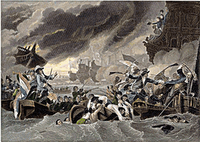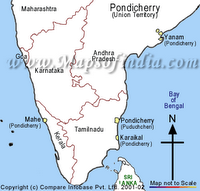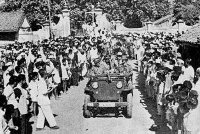Pondicherry History
 Nestled on the east coast of India is the old French colony of Pondicherry. The charm of French culture planted by the French East India Company in 1673 still lingers in the eastern leafy half of the city. Further inland, far away from the sound of the waters of the Bay of Bengal lapping against the rocky coast,
Nestled on the east coast of India is the old French colony of Pondicherry. The charm of French culture planted by the French East India Company in 1673 still lingers in the eastern leafy half of the city. Further inland, far away from the sound of the waters of the Bay of Bengal lapping against the rocky coast,  is the other half of Pondicherry. A city filled with Indian charm, crowded streets, sidewalks packed with shop keepers and their wares, everywhere commerce afoot along with pedestrians, two wheelers, push carts and aging pedicabs provide a glimpse of a provincial time fading with each lap of a Bengali wave.
is the other half of Pondicherry. A city filled with Indian charm, crowded streets, sidewalks packed with shop keepers and their wares, everywhere commerce afoot along with pedestrians, two wheelers, push carts and aging pedicabs provide a glimpse of a provincial time fading with each lap of a Bengali wave.Pondicherry has a storied past. Ancient Greek and Roman geographers referred to the area as Poduke. Indian homegrown kingdoms of Palava, Chola and Pandya shared in the history of Pondicherry as did Muslim invaders from the north.
 The French had their problems first with the Dutch in 1693 when they lost control of the area. With the signing of Treaty of Ryswick in 1699 that settled the War of the Grand Alliance, which pitted France against the Grand Alliance of England, Spain, the Holy Roman Empire and the United Provinces, the French were back in control of their Pondy pedicabs.
The French had their problems first with the Dutch in 1693 when they lost control of the area. With the signing of Treaty of Ryswick in 1699 that settled the War of the Grand Alliance, which pitted France against the Grand Alliance of England, Spain, the Holy Roman Empire and the United Provinces, the French were back in control of their Pondy pedicabs.Twenty years later, French East India Company was reconstituted as the Perpetual Company of the Indies. Thereafter the French, the weakest of the European colonial powers, cobbled together the tiny, scattered Indian territories of Mahe, Yanam, Karaikal and Chandernagar to form their Indian foothold.
The French also had their hands full with the British. During the Anglo-French wars, the British captured Pondicherry in 1761, but the Treaty of Paris two years later returned
 the city to the French. It was taken again by the British in 1793 amid the Wars of the French Revolution, but once again returned to France in 1814. Around this time, in 1803, the French were also divesting themselves of some river front property selling a half billion acres to Thomas Jefferson in a deal called the Louisiana Purchase. In the early part of the 19th century, the French had their hands full, but things settled down for the next 150 years.
the city to the French. It was taken again by the British in 1793 amid the Wars of the French Revolution, but once again returned to France in 1814. Around this time, in 1803, the French were also divesting themselves of some river front property selling a half billion acres to Thomas Jefferson in a deal called the Louisiana Purchase. In the early part of the 19th century, the French had their hands full, but things settled down for the next 150 years.When the British relinquished control of their Indian empire in 1947, the French said, “Pardone, monsieur! We French have other plans.” The French were not the lone European holdouts. The Portuguese in Goa hit the pause button as well on Indian incorporation.

By 1954, French – Indo discussions had progressed with the conclusion that Pondicherry and most of the original scattered territories of the old Perpetual Company of the Indies would be incorporated into India as Union Territory of Pondicherry. France ceded to India full sovereignty over the territories July 1, 1963.
 The Portuguese remained a bit more persnickety, refusing to accede to India's request to relinquish control their enclaves of Goa, Diu and Daman. On December 12, 1961 the Indian army launched Operation Vijay and marched 30,000 troops into Goa. The Portuguese had only 3,300 defenders. After a 26 hour war, the Portuguese were heading for the Iberian Peninsula and the Indian troops were home by Christmas.
The Portuguese remained a bit more persnickety, refusing to accede to India's request to relinquish control their enclaves of Goa, Diu and Daman. On December 12, 1961 the Indian army launched Operation Vijay and marched 30,000 troops into Goa. The Portuguese had only 3,300 defenders. After a 26 hour war, the Portuguese were heading for the Iberian Peninsula and the Indian troops were home by Christmas.

0 Comments:
Post a Comment
<< Home